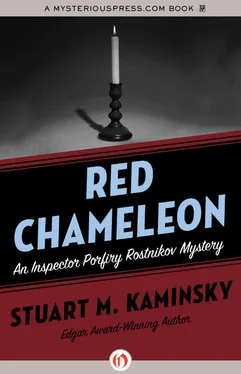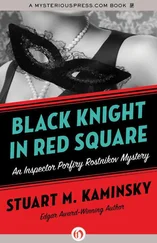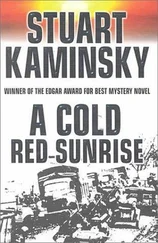Stuart Kaminsky - Red Chameleon
Здесь есть возможность читать онлайн «Stuart Kaminsky - Red Chameleon» весь текст электронной книги совершенно бесплатно (целиком полную версию без сокращений). В некоторых случаях можно слушать аудио, скачать через торрент в формате fb2 и присутствует краткое содержание. Год выпуска: 2012, ISBN: 2012, Издательство: MysteriousPress.com/Open Road, Жанр: Полицейский детектив, на английском языке. Описание произведения, (предисловие) а так же отзывы посетителей доступны на портале библиотеки ЛибКат.
- Название:Red Chameleon
- Автор:
- Издательство:MysteriousPress.com/Open Road
- Жанр:
- Год:2012
- ISBN:978-1-4532-6632-8
- Рейтинг книги:4 / 5. Голосов: 1
-
Избранное:Добавить в избранное
- Отзывы:
-
Ваша оценка:
- 80
- 1
- 2
- 3
- 4
- 5
Red Chameleon: краткое содержание, описание и аннотация
Предлагаем к чтению аннотацию, описание, краткое содержание или предисловие (зависит от того, что написал сам автор книги «Red Chameleon»). Если вы не нашли необходимую информацию о книге — напишите в комментариях, мы постараемся отыскать её.
Red Chameleon — читать онлайн бесплатно полную книгу (весь текст) целиком
Ниже представлен текст книги, разбитый по страницам. Система сохранения места последней прочитанной страницы, позволяет с удобством читать онлайн бесплатно книгу «Red Chameleon», без необходимости каждый раз заново искать на чём Вы остановились. Поставьте закладку, и сможете в любой момент перейти на страницу, на которой закончили чтение.
Интервал:
Закладка:
“‘He breathes,’ I said softly.
“‘A little,’ said Abraham.
“‘A little.’
“We hurried back to the carriage and drove into the night with me at the reins, feeling confidence returning for the first time since we had left Yekteraslav. I turned to share my feeling with Abraham, but he was slumped forward, his face in his hands.
“‘You think he’s dead?’ asked Abraham, squinting into the darkness.
“‘No,’ I replied. ‘He’s not dead.’
“‘How do you know?’
“‘I don’t know,’ I cried. ‘Stop talking.’
“We rode in silence and opened the cloth purse of the man we had robbed to find money, both paper and coin. It seemed like a lot.
“‘We had to do it,’ said Abraham.
“I nodded in the darkness, the wind and the smell of the sweating horse overwhelming me as I pushed the money in my pocket and flung the purse and the gun into the night. I did not want to know more about the man.
“‘If they find him, when they find him, they will come looking for this carriage,’ I said. ‘We’ll give ourselves a day with it. No more.’
“‘It’s a fine carriage and a fine horse,’ said Abraham, sounding well to me for the first time since we left Yekteraslav.
“‘Maybe we can sell it,’ I said as I climbed into the back seat and lay down to rest. ‘Do not stop in any town or village. I’ll sleep an hour, and then we’ll rest the horse and I’ll drive.’
“Abraham agreed, though I knew he would have liked to drive the carriage forever, never stopping or thinking, just feeling the reins and the jogs in the road.
“I slept for four hours. When I awoke, the carriage had stopped. Abraham had unharnessed the horse and was letting it eat dry grass off the road. Across a marshy field, I could see a town that looked large, but it was much too soon for Riga.
“‘Stay here with the horse,’ I told Abraham. ‘I’ll go into the town and buy some clothes. Two ragged Jews riding a fine carriage is not going to be overlooked.’
“‘So we will become two fine Jews with a carriage,’ Abraham said with a smile.
“I nodded and looked at my friend, whose cap had slipped forward over his eyes, making him look like a village fool as he urged the horse to eat.
“‘Talk to no one and stay here,’ I said.
“‘I will.’
“The town was Gomel, and the streets were cobbled, but there were still huge puddles from the thawing snow and rain. There were many Jews in their beards and hats. I could see the tips of their prayer shawls under their coats, but I needed no signs of clothing to recognize other Jews, with their dark, frightened look that marked them even if their features did not.
“A small boy with fingers sticking through ragged gloves sold me two hard bagels in the street from a woven straw basket. I ate one and put the other in my pocket for Abraham.
“‘Where can I buy some clothes?” I asked the boy in Yiddish.
“The boy looked at me without looking, for to look openly might earn a blow, might imply that the stranger was too ragged to be looking for decent clothing. The boy could not have been more than nine, but he had learned much, perhaps all of what he would need for life in Gomel.
“‘Nothing expensive, mind you,’ I said. I knew a coin to the boy would get me a quick answer, but I was reluctant to part with the money. My plan was forming: we would spend no more than we had to, because I didn’t know how much it might cost to get on a boat to England or America. In the near sleep of the night before I had decided that we had to get by on the money we had taken from the man with the gun, that if we did make it on the money, then the man would have made a contribution to our survival. The attack would have been necessary and meaningful, a sacrifice. Anything less than that and what we had done would be an act of brutality, meaningless animal brutality. The man would recover, get more money, buy another carriage. In fact, I had reasoned, this might turn out to be the best deed the man had ever done, to help two desperate young men.
“‘… dead,’ said the boy with the bagels.
“‘Dead?’ I cried, looking around.
“‘I said,’ continued the boy, ‘that Menahcan the tailor is dead, but his son, Yigdol, has clothes. I’ll take you.’
“I followed the boy for a few streets to a two-story brick building with a wooden door the boy pointed to and waited. I impulsively took out a coin and gave it to him.
“‘ Shalom,’ said the boy.
“‘ Shalom,’ I said, and knocked at the door.
“Yigdol the tailor proved to be a few years older than I, a few inches taller. There were no words or questions, just guarded looks of curiosity through the young tailor’s thick glasses. Yigdol’s one-room home and shop was small, one wall lined with cheap thin books, the other with heaps of clothing.
“‘I need a suit,’ I said.
“‘Desperately,’ said Yigdol, looking over his glasses. I wondered why he kept the room so dark, for it seemed obvious that a man who sews and reads in the dark would soon go blind, and Yigdol seemed well on the way to it.
“‘You have something, something good, not work clothes but not too expensive? I have some money. Not much, but some.’
“Yigdol looked at me, put aside the dark cloth he was sewing, and went to a black pile in the corner near a dirty window. Outside a child was screaming at another child.
“In ten minutes, we had negotiated for a reworked suit and a white shirt, and only when the negotiation was completed did I mention the suit for Abraham, a suit that would have to be chosen without the wearer present. Yigdol acted as if he understood, and a second suit was selected.
“In preparation, I had shifted a small amount of money from one pocket to the next and took out a few crumpled rubles to pay the tailor, who looked at them and at me.
“‘Is there something wrong with my money?’
“‘No,’ said Yigdol, ‘and there’s nothing wrong with my brain, though my eyes are failing, but even failing, they see too much and ask too many questions, which may be why the Almighty is taking them back. They ask, where did this young man come from, why is he frightened, why does he buy two suits, and why does he keep so much money in his side pocket and pretend to be so little?’
“‘I’m a tailor,’ explained Yigdol. ‘I notice bulges, tears, and faces. Don’t fold your bills and don’t keep them in your pants pocket. That is what peasants do. One might wonder why a peasant has so much money. These clothes may make you look like a shopkeeper, but you must act to fit the clothes.’
“‘What do you want of me?’ I said with my eyes on the man at the same time I sought a weapon in the corners or on the table. The scissors and knife were within reach. ‘I’ll pay no more than we agreed on.’
“Yigdol laughed. ‘I want the promised land,’ he said. ‘I want it now. Can you pay me that? I want no more of your money than we agreed upon. You have nothing to fear from me.’
“‘You think I’m funny,’ I said in some confusion.
“Yigdol shook his head no and pushed the glasses up on his ample nose.
“‘No, I think you are afraid and could use some help. You are running from the Revolution. You are from the south. You have the accent. You are heading north, for Riga, the sea?’
“‘Yes, for Riga.’
“Yigdol smiled proudly at the confirmation of his deduction. “‘Go to Palestine,’ he said.
“‘Perhaps,’ I said. ‘Yes, perhaps.’ I said it as if I were really considering it, but I was not. Yigdol, with his failing eyes, saw through me and gave an amused look that shook my confidence.
“‘I have a carriage to sell,’ I said.
Читать дальшеИнтервал:
Закладка:
Похожие книги на «Red Chameleon»
Представляем Вашему вниманию похожие книги на «Red Chameleon» списком для выбора. Мы отобрали схожую по названию и смыслу литературу в надежде предоставить читателям больше вариантов отыскать новые, интересные, ещё непрочитанные произведения.
Обсуждение, отзывы о книге «Red Chameleon» и просто собственные мнения читателей. Оставьте ваши комментарии, напишите, что Вы думаете о произведении, его смысле или главных героях. Укажите что конкретно понравилось, а что нет, и почему Вы так считаете.












